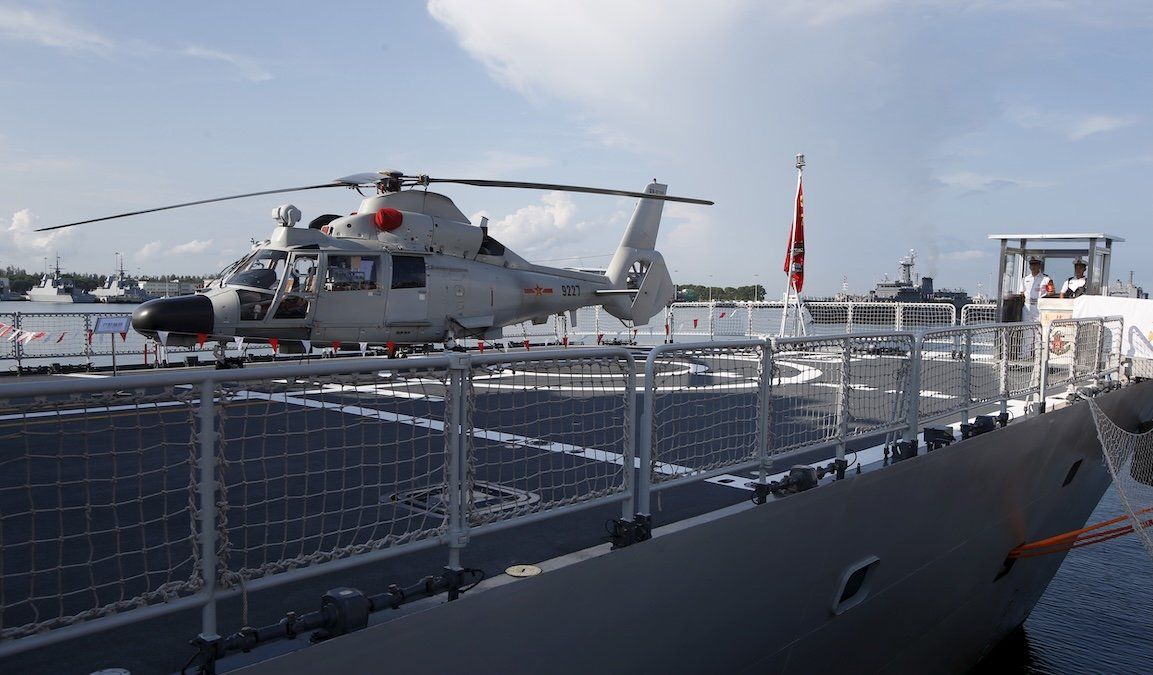China’s “dangerous” helicopter maneuver escalates tensions with US and Philippines
A Chinese People's Liberation Army Navy Harbin Z-9 helicopter sits on CNS Yulin during a display of warships ahead of an exhibition at Changi Naval Base in Singapore on May 18, 2015.
A Chinese naval helicopter flew nearly 10 feet from a Philippine patrol plane on Tuesday over a contested reef in the South China Sea, escalating tensions with Manila and Washington in the airspace over international waterways Beijing claims as its own.
The move, which the US condemned as a “dangerous maneuver,” comes months after a series of seaborne attacks in which Chinese coast guard vessels rammed Philippine ships.
Both Beijing and Manila claim the Scarborough Shoal – known in China as Huangyan Island and in the Philippines as Panatag Shoal or Bajo de Masinloc – located less than 150 miles off the west coast of the main Philippine island of Luzon. But China has controlled the waters around the unpopulated reef since 2012. In recent months, the Philippines and the US have sought to assert Manila’s sovereignty by flying air patrols over the shoal.
In a tense 30-minute standoff on Tuesday, a gray People’s Liberation Army naval Harbin Z-9 chopper hovered just over the wing of a Philippine C-208 light utility plane after Beijing said the Philippines “illegally invaded the airspace” over the shoal. Washington rebuked the move against its ally, whose 74-year mutual defense treaty both the Biden and Trump administrations have sought to reinforce over the past year.
“We condemn the dangerous maneuvers by a PLA Navy helicopter that endangered pilots and passengers on a Philippine air mission,” MaryKay Carlson, the US ambassador to Manila, wrote in a post on X. “We call on China to refrain from coercive actions and settle its disputes peacefully in accordance with international law.”
Flashback to a heated summer: Last June, Chinese coast guards wielding knives and axes rammed their ship into a Filipino vessel, injuring eight sailors and severing the thumb of one. The attack was intended to halt a resupply mission to a Philippine outpost in the Sierra Madre, a rusting World War II vessel run aground years ago on the shoal to mark Manila’s claim. China accused the Philippines of secretly hauling equipment to reinforce the decaying ship among food and water supplies for Philippine marines stationed on the outpost.
The bottom line: “While scary, this is more a continuation of near-boiling point tensions, where neither Beijing nor Manila wants the dispute to spill over into outright conflict,” said Jeremy Chan, a senior analyst at Eurasia Group. But Tuesday’s incident, he added, is “increasing the risk for both China and the Philippines that there could be some kind of aerial collision between the two countries.”
